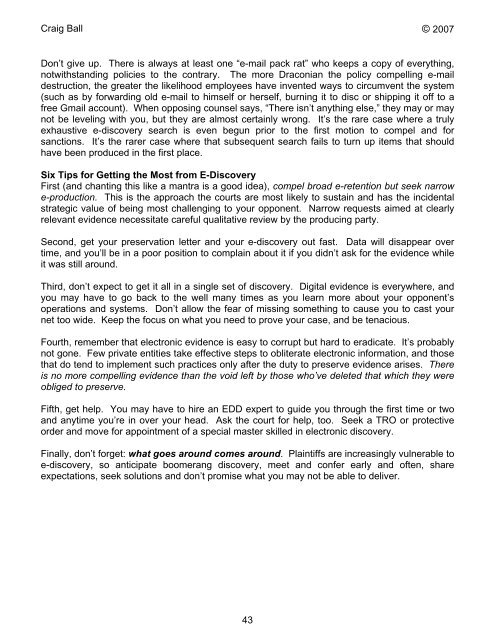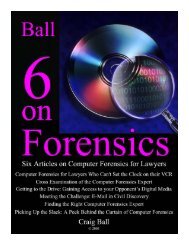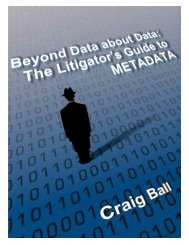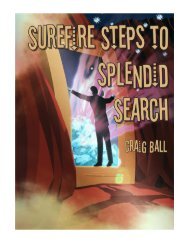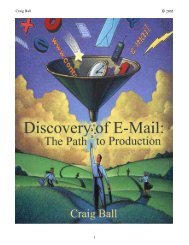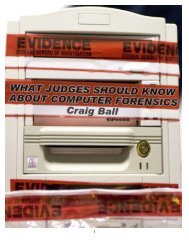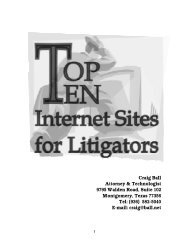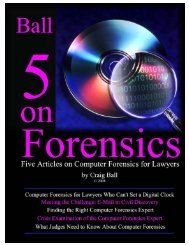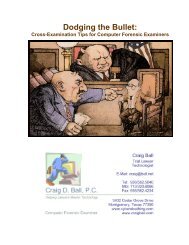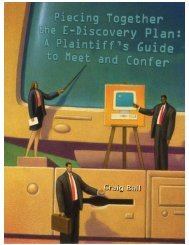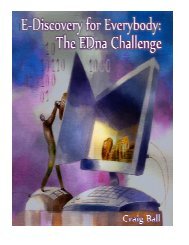Six Articles on Electronic - Craig Ball
Six Articles on Electronic - Craig Ball
Six Articles on Electronic - Craig Ball
You also want an ePaper? Increase the reach of your titles
YUMPU automatically turns print PDFs into web optimized ePapers that Google loves.
<strong>Craig</strong> <strong>Ball</strong> © 2007<br />
D<strong>on</strong>’t give up. There is always at least <strong>on</strong>e “e-mail pack rat” who keeps a copy of everything,<br />
notwithstanding policies to the c<strong>on</strong>trary. The more Drac<strong>on</strong>ian the policy compelling e-mail<br />
destructi<strong>on</strong>, the greater the likelihood employees have invented ways to circumvent the system<br />
(such as by forwarding old e-mail to himself or herself, burning it to disc or shipping it off to a<br />
free Gmail account). When opposing counsel says, “There isn’t anything else,” they may or may<br />
not be leveling with you, but they are almost certainly wr<strong>on</strong>g. It’s the rare case where a truly<br />
exhaustive e-discovery search is even begun prior to the first moti<strong>on</strong> to compel and for<br />
sancti<strong>on</strong>s. It’s the rarer case where that subsequent search fails to turn up items that should<br />
have been produced in the first place.<br />
<str<strong>on</strong>g>Six</str<strong>on</strong>g> Tips for Getting the Most from E-Discovery<br />
First (and chanting this like a mantra is a good idea), compel broad e-retenti<strong>on</strong> but seek narrow<br />
e-producti<strong>on</strong>. This is the approach the courts are most likely to sustain and has the incidental<br />
strategic value of being most challenging to your opp<strong>on</strong>ent. Narrow requests aimed at clearly<br />
relevant evidence necessitate careful qualitative review by the producing party.<br />
Sec<strong>on</strong>d, get your preservati<strong>on</strong> letter and your e-discovery out fast. Data will disappear over<br />
time, and you’ll be in a poor positi<strong>on</strong> to complain about it if you didn’t ask for the evidence while<br />
it was still around.<br />
Third, d<strong>on</strong>’t expect to get it all in a single set of discovery. Digital evidence is everywhere, and<br />
you may have to go back to the well many times as you learn more about your opp<strong>on</strong>ent’s<br />
operati<strong>on</strong>s and systems. D<strong>on</strong>’t allow the fear of missing something to cause you to cast your<br />
net too wide. Keep the focus <strong>on</strong> what you need to prove your case, and be tenacious.<br />
Fourth, remember that electr<strong>on</strong>ic evidence is easy to corrupt but hard to eradicate. It’s probably<br />
not g<strong>on</strong>e. Few private entities take effective steps to obliterate electr<strong>on</strong>ic informati<strong>on</strong>, and those<br />
that do tend to implement such practices <strong>on</strong>ly after the duty to preserve evidence arises. There<br />
is no more compelling evidence than the void left by those who’ve deleted that which they were<br />
obliged to preserve.<br />
Fifth, get help. You may have to hire an EDD expert to guide you through the first time or two<br />
and anytime you’re in over your head. Ask the court for help, too. Seek a TRO or protective<br />
order and move for appointment of a special master skilled in electr<strong>on</strong>ic discovery.<br />
Finally, d<strong>on</strong>’t forget: what goes around comes around. Plaintiffs are increasingly vulnerable to<br />
e-discovery, so anticipate boomerang discovery, meet and c<strong>on</strong>fer early and often, share<br />
expectati<strong>on</strong>s, seek soluti<strong>on</strong>s and d<strong>on</strong>’t promise what you may not be able to deliver.<br />
43


